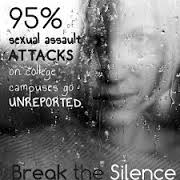Listen to the survivors
 For sure, progress is being made to address sexual violence and other harassment on many college campuses. Yet amidst the commotion of new regulations, official promises, and the occasional push back against victims, one thing remains clear:
For sure, progress is being made to address sexual violence and other harassment on many college campuses. Yet amidst the commotion of new regulations, official promises, and the occasional push back against victims, one thing remains clear:
Stop your noisemaking and listen first to the survivors.
Andrea Pino was sexually assaulted twice at the University of North Carolina, Chapel Hill. The second time a fellow student she didn’t know raped her; she suffered a concussion and internal bleeding. She had not been drinking. In fact, she had recently been hired as an RA, and had just walked a friend to a party.
“I couldn’t call it rape for a very long time,” Pino told attendees at a conference last week. “I only started to after hearing about it from my hall mates. In a hall of 36 women, 17 of us were sexually assaulted by the time we finished our sophomore year — different degrees, perpetrators, and circumstances, but we had the same narrative of not knowing what to do.”
Pino, like too many other young women — and young men as well — ran into an uninformed bureaucratic wall. It took three semesters to learn what her rights were under federal law. After dropping multiple classes, an academic advisor told Andrea that perhaps she was just being lazy and could not handle UNC.
This disgrace is changing on some campuses — although many still fail to comply with minimum standards for handling sexual assault complaints fairly, and to assist survivors in meaningful ways. Check out my article this week in The Huffington Post for more on this.
In a hall of 36 women, 17 of us were sexually assaulted by the time we finished our sophomore year.
First, please listen to Pino again. As a second-generation Cuban American, she was the first in her family to attend college. She hasn’t completed her degree yet. Fearing for her safety, Pino dropped out of UNC. Yet she has found her voice helping other students know their rights, and connecting other activists and other assault survivors on campuses across the country, in part as a co-founder of End Rape On Campus.
A week or so after her second ordeal Pino ran a half marathon. “But it was after that I realized my body wasn’t the same as it had been during training, and it wasn’t because I hadn’t been running enough,” she said. “It was because my body had been damaged.”
On Monday, federal education authorities issued final regulations meant to help students with these ordeals, the Violence Against Women Act amendments to the Clery Act. More information on strategies and practices that are helping institutions prevent and respond to sexual violence are available at the nonprofit Clery Center for Security on Campus.
Please pay attention, especially if you have a college-age daughter or son. And listen closely to the survivors.
For related articles, check The Huffington Post’s “Breaking the Silence” section.

This piece of writing is really a pleasant one it helps new the web visitors, who are wishing in favor of blogging.